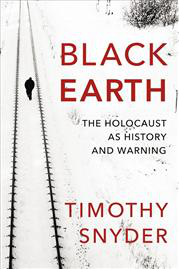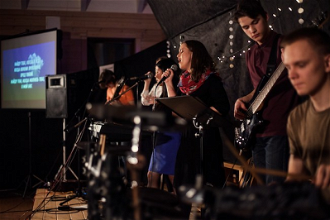Book: 'Black Earth' by Timothy Snyder

'Black Earth' by Timothy Snyder, Bodley Head
Although the publishing industry is heaving with new titles about World War Two, rarely is proper attention paid to Hitler's motivation, and the racial obsessions that led to the defining event of the Twentieth Century. Timothy Snyder provides a fascinating analysis of Hitler's worldview: the inferiority of every race but the Germans, and the need to possess the black earth of Soviet Ukraine on which to grow food to sustain the master race.
Hitler admits he found inspiration in America's decimation of its Native American ethnic groups and the ensuing land grab. He admired Thomas Jefferson and his policy of pushing the indigenous people west of the Mississippi River. He wrote that the Volga would be his Mississippi, planning to starve the Russians and Ukrainians so Germans could prosper.
Hitler was so certain that Jews controlled the Soviet Union that he believed if he killed enough Jews, the USSR would collapse. Imagine his surprise when the Slavs he so despised triumphed where his own forces failed.
Snyder also tackles the unedifying enthusiasm with which people in the Ukraine, the Baltic States, Belarus and parts of Poland killed the Jews. He argues that everywhere the Nazis or Soviets had occupied they had destroyed the existing state, making it easy for people to kill Jews who no longer had any legal protection. Hence a relatively small proportion of Germany's Jews were killed, while the vast majority of Jews in the Baltic States and Ukraine were murdered. Snyder argues 99% of Estonia's Jews were murdered whereas 99% of Denmark's survived because Denmark continued to be a functioning state offering Jewish citizens protection; Estonia ceased to exist once occupied.
He also makes a case that so many people had collaborated either with the occupying Nazis or Soviets that they were keen to expunge their own record by blaming everything on the Jews, and proving their nationalism by therefore killing the Jews. "Nationalists told fellow Ukrainians that they could purge themselves of the stain of collaboration with the Soviets by killing one Jew," writes Snyder.
These everyday murderers were not necessarily anti-Semitic, but they were intent on disassociating themselves with their past collaboration with the occupying force, whether it was Nazi or Soviet. "The involvement of essentially everyone in the Soviet system, which was the political reality, could be reduced to the idea of a few guilty Jews." The ultimate scape goats, then.
Snyder writes, "Ukrainians who spent the first two years of the war helping the local NKVD [forerunner of the KGB] commander (who was Jewish) deport Poles, Jews and Ukrainians shifted to helping the SS kill Jews, Ukrainians and Poles whom they -actual Soviet collaborators- denounced as Soviet collaborators. The Germans were unable to process the rush of denunciations and, falling back on their own racial illusions, were often manipulated."
The media commonly presents Auschwitz as the death camp where most of Europe's six million Jews were killed. However Snyder explains that the majority of Jews were shot at the edge of pits, falling into mass graves in Ukraine, Belarus, Poland and the Baltic States well before Auschwitz was even in operation. Far from being an impersonal, mechanised operation, then, these murders could not have been more up-close-and-personal.
Snyder is also useful in understanding why Stalin slaughtered so many of the brave European partisans who fought the Nazis, and considered themselves communists: "Just as people who resist one form of tyranny will tend to resist another, people who have collaborated with one form of tyranny will tend to come to terms with the next."
Snyder's extraordinary book may be about events more than seventy years ago, but its lessons about human nature are as relevant now as then.


















